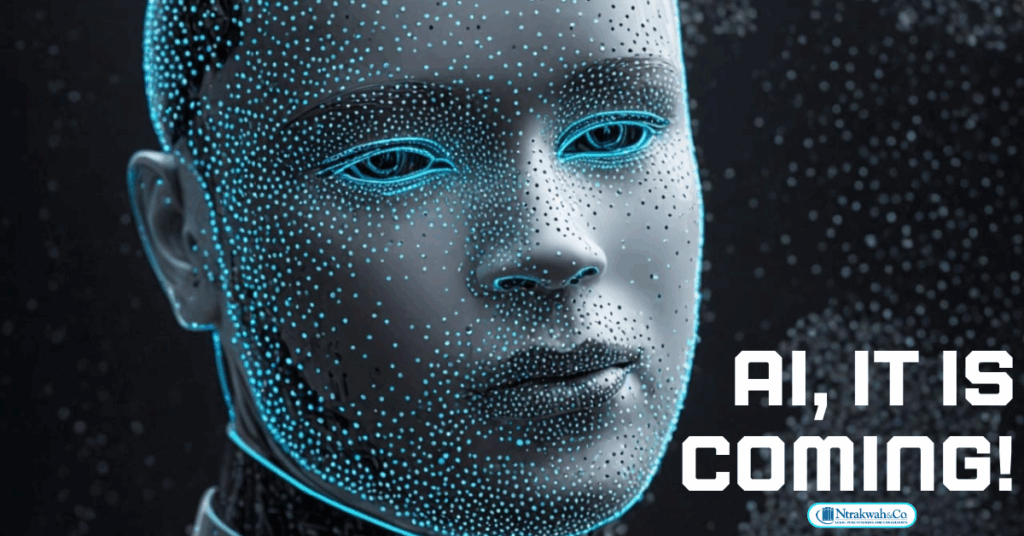Artificial Intelligence, the next phase of Information Technology is coming!
(Impact on Law Practice and Judiciary in Ghana)
Introduction
“AI, IT is coming!” is an overview of and primarily my thoughts on Artificial Intelligence, its impact on law practice and the judiciary in Ghana.
1990s
My first interaction with home computers, hardware and software was in the early 1990s. It was with a Commodore 64, which is reported to be the highest selling single computer model of all time. During the 1990s, I attended a computer training school at Osu, Accra, Ghana. At the time, a computer mouse was not common, although it had been invented. I studied computing without a mouse and till date, I am still able to navigate very well without a mouse, touchpad or touchscreen.
Y2K and beyond
Y2K is the abbreviation for “the year 2000”. It was anticipated that, computers would not be able to change dates or transition from 1999 to 2000. This bug, was expected to cause computers and networks around the world to malfunction and create havoc. Clearly, this doomsday prediction did not happen or at least on the scale that was anticipated.
In the year 2007, I returned to Ghana after qualifying as a Barrister in England and Wales and thereafter enrolled as a lawyer in Ghana. I have conscientiously followed, applied and written on technology and law in Ghana. Some of my articles are listed below:
- Do you Own and Fly a Drone in Ghana? https://www.lexology.com/library/detail.aspx?g=b3926783-8cdb-4068-b40d-41d6ed4762f3
- What to Expect-Ghana’s Draft Drone Directives https://ntrakwahandco.com/what-to-expect-ghanas-draft-drone-directives/
- Revolutionising Land Litigation in Ghana Through the use of Satellite Imagery https://ntrakwahandco.com/revolutionising-land-litigation-in-ghana-through-the-use-of-satellite-imagery/
- Litigation and Technology: Making the Case for Virtual Courts in Ghana https://ntrakwahandco.com/litigation-and-technology-making-the-case-for-virtual-courts-in-ghana/
- Behind the Scenes of a Virtual Court in Ghana https://ntrakwahandco.com/behind-the-scenes-of-a-virtual-court-in-ghana/
From the “Introduction” to “1990s” and “Y2K and beyond”, it is clear that technology has evolved across the world and in Ghana. Even though the pace at which technology has evolved in Ghana has not been as fast as the rest of the world, Ghana eventually catches up with technology. Law practice, the judiciary, administration of the law, legal and regulatory framework are also not exempted.
From my experience with virtual courts in Ghana, it has been a success although there is more room for improvement. I have also successfully used satellite imagery in a case involving land dispute. Undoubtedly, technology benefits clients, the legal profession and the judiciary.
Terminologies
Robot: is defined in the Penguin Dictionary as an automatic apparatus or device that performs functions ordinarily ascribed to human beings; a humanoid machine that walks and talks.
Bot: a short for robot and also called an internet bot is a computer program that operates as an agent for a user or other program or to simulate human activity. 1
Extinction?
Is the legal profession in Ghana on the brink of extinction? AI, IT is coming! AI, IT is here! My first brush with AI was when I watched the movie “A.I. Artificial Intelligence”2 in the United States of America. The movie is inspired by a science fiction writer and set in the future where robots of increasing sophistication have become a fabric of society.3 A family takes in an AI Robot as a substitute son to love in the stead of their human son who is terminally ill. When the human son returned home, the AI Robot which was programmed to love and be more human like becomes very mean to the human son (despite it being programed to just love). The AI Robot is abandoned in the woods by the family where it meets a sex-bot on the run after being framed for murder. Together, they evade humans and journey to find someone who the AI Robot believes can turn into a real boy so that its mother would love him.
Are lawyers and judges going to be replaced by AI Robots? Instead of coming to me, a human, for legal advice, would you rather speak to an AI Robot? Are corporate entities simply going to purchase AI Robots to replace in-house counsel?
I envisioned a day when justice would be dispensed through a system like an Automated Teller Machine (ATM). An ATM works by slotting in your ATM card, entering your pin, selecting the amount of money needed and cash is dispensed. Such a system could replace misdemeanours and non-contentious matters at all lower/first instance courts. One would just access the ATM-like court, file a complaint and the respondent would be notified electronically. Evidence could be uploaded electronically and AI delivers a judgment. Time has since elapsed and with the proliferation of smart phones, the idea of physically walking to an ATM for justice to be dispensed has even become archaic. Everything can be done from your smart phone.
“DoNotPay” is a subscription based legal service and chatbot available online. It is said to be an “AI Lawyer”. DoNotPay is reported to have successfully contested 250,000 parking tickets in London and New York and out of that, won 160,000.
Is AI still science fiction? Well…, AI, the next phase of technology and its impact on law practice and the judiciary in Ghana is examined below.</p?
Artificial Intelligence
AI can be described as “using technology to automate tasks that normally require human intelligence4”. AI was once described by Marvin Minsky in 1968 as “the science of making machines do things that will require intelligence if done by man.”5
Intelligence can be explained as the ability to acquire and apply knowledge, learn or understand or to deal with new or trying situations6. When machines are able to acquire knowledge, learn and deal with new or trying situations on their own (like humans) without the intervention of humans, it is done artificially, hence Artificial Intelligence. When it comes to Artificial Intelligence, there are various way by which it is achieved. I do not intend to delve into that.
Law Practice
Research, drafting of contracts, review of contracts, review of relevant case law and case summaries, all of which are tasks performed by lawyers can now be done by AI, robots or bots. Logically, if AI, robots or bots are able to perform all the tasks of a lawyer and have the skillset, lawyers could be out of a job and could become extinct. Thus, if achieved, it would imply that law practice will not be the only profession affected and the entire human race would have to either co-exist with robots as the new normal or battle robots as commonly depicted in apocalyptic wars between humans and machines in movies. While sounding plausible, various researchers, creators of AI and writers, have given the assurance that AI is not quite there yet and we are not under any imminent existential threat by AI.
That notwithstanding, there are some very powerful AI tools or apps already in existence that are shaping the legal profession today and many more will evolve to transform the legal profession in future.
In a Supreme Court case I am currently working on, I have read and tagged over 10 law books, 15 court cases, had lengthy discussions with other lawyers in the firm and guess what, this is only the beginning and I have not even started writing my submission. Meanwhile, considerable time and effort has already been expended not forgetting the time and effort spent in reviewing the three-volume record of appeal to find that one page was missing. Imagine a world where all these were done by AI and results given to me in seconds. That would certainly be a game changer!
Imagine being required to read a law, for example, Legal Profession Act, 1960 (Act 32) to determine who qualifies as a lawyer in Ghana. Various AI platforms exists today that analyse pdf documents and answer your questions. Simply upload Act 32 in the required format, ask who qualifies as a lawyer in Ghana and “see magic”.
Judiciary
The number of cases going to the Supreme Court of Ghana have increased exponentially such that as recent as July 2024, a case has been made for more judges to be appointed to the Supreme Court of Ghana.
Delivering judgments involves the application of the principle of stare decisis, examining records of appeal for errors, misdirection of law, among others. All these could be handled by AI thereby reducing the workload of a judge. I dare say that entire judgments based purely on Ghanaian law could be written by AI at the appropriate time. AI platforms can be developed to reduce the workload of judges in Ghana. Although I must admit that we are still grappling with implementing a fully functional e-justice system.
Explore the popular “ChatGPT” and come to your own conclusion on AI and its impact on law practice and the judiciary in Ghana. ChatGPT is a chatbot and virtual assistant which mimics a human conversationalist. It provides answers to questions and writes a plethora of things.
“Write me a judgment based on Ghanaian law on road traffic accident”. “Give me Ghanaian cases on negligence”. I invite you to instruct ChatGPT accordingly and see what happens.
I am confident that you will conclude that Artificial Intelligence is already impacting the practice and administration of law in Ghana.
Caution, caution, caution!
Like any other form of technology, inappropriate use, ethical issues and sanctions are abound. Therefore, I strongly recommend that you know the boundaries of Artificial Intelligence and the ethics of the legal profession. Blaming technology will not absolve you from breaches of professional conduct and etiquette rules. Most of these AI platforms also have disclaimers.
TAKE NOTE that while the myriad of AI platforms currently in existence can give plausible answers, the answers may not always be correct. Some AI platforms have made up non-existent judgments and law reports which has resulted in some lawyers being sanctioned or disbarred in other jurisdictions. ChatGPT and other AI platforms have also given totally wrong answers.
Conclusion
While AI is not going to replace lawyers in Ghana anytime soon, its use and applicability are inevitable. As a matter of fact, personal research conducted has revealed that AI is already in use in the practice of law in Ghana.
Author:
Nana Yaw Ntrakwah, Esq.
Partner, Ntrakwah and Co., Legal Practitioners & Consultants
26th July 2024
1https://www.techtarget.com/whatis/definition/bot-robot#:~:text=A%20bot%20%2D%2D%20short%20for,without%20specific%20instructions%20from%20humans.
2https://www.youtube.com/watch?v=oBUAQGwzGk0
3https://www.imdb.com/title/tt0212720/reviews
4Harry Surden, Artificial Intelligence and Law: An Overview, 35 GA. ST. U. L. Rev. (2019). Available at
5Semantic Information Processing v (M. Minsky ed 1968)
6Merriam-Webster Dictionary

